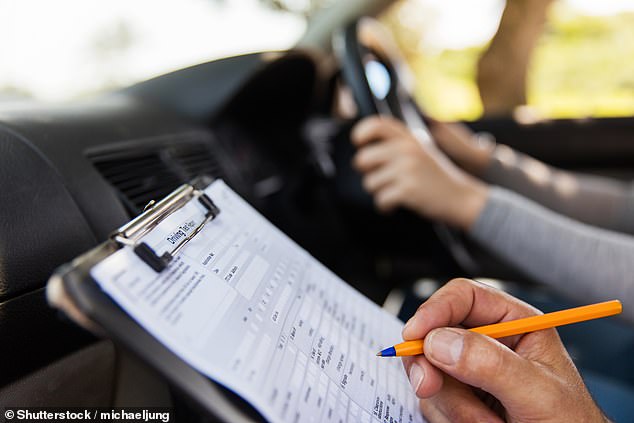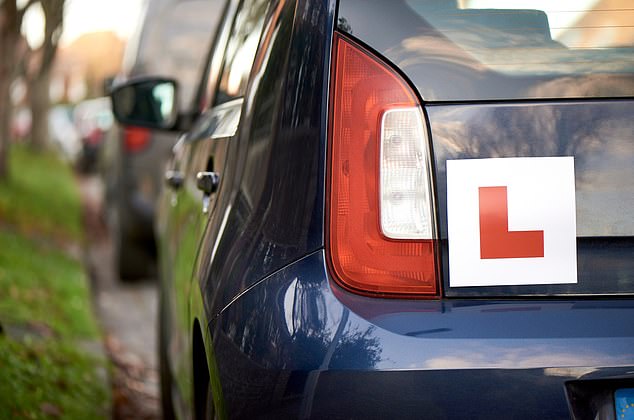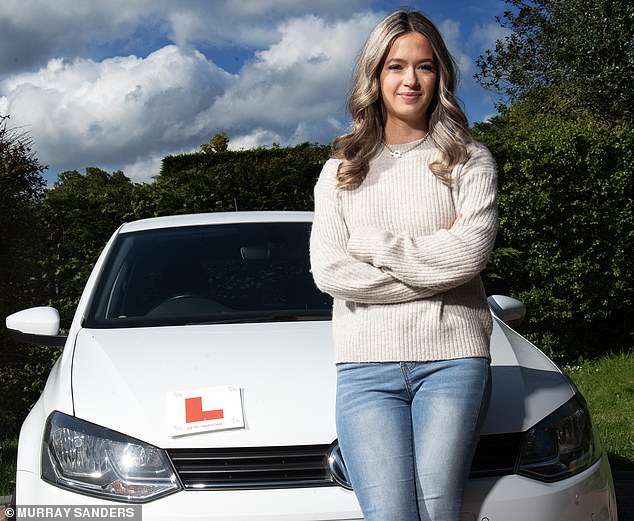Learner drivers in large areas of Britain are being forced to wait six months for their test date, Money Mail can reveal.
The delay means that students who book a driving test today at one of the 107 locations – a third of all test centers – including Cheltenham, Guildford and Taunton, are unlikely to obtain a driving license before October.
Covid-19 lockdowns led to a shortage of exam places across the country, with more than 450,000 exams canceled in the 12 months to March 2021.
But three years on, the overall average waiting time for a test remains 17 weeks (down from a high of almost 21 in August), as the Driver and Vehicle Standards Agency (DVSA) has not been able to eliminate the delay.
Nearly 80 per cent of testing centers are more than six weeks behind schedule, the average waiting time before the pandemic, according to figures obtained by Money Mail through a Freedom of Information request.
Long distance: Georgina Joaquim, 17, has been learning to drive since March, but was only able to book a test for July at a center near Portsmouth, more than 30 miles away.
The bottleneck means driving instructors are now telling learners to book a test before having their first lesson.
Naughton Dunn, a driving teacher in Ludlow, Shropshire, says: “I’ve said to students, ‘Let’s book the practical test,’ before they’ve even gotten behind the wheel of a car.”
Some are so desperate to get a job that they are willing to travel hundreds of miles to a testing center, he says.
‘The situation is an absolute nightmare. People in Edinburgh and three from the London area contacted me to help them prepare for a trial in Ludlow.
“I had to turn off my phone because I get messages all night from learner drivers wanting to book lessons.”
Mark Steeples, a driving instructor in Skipton, North Yorkshire, says students in his area are already trying to book driving tests for September.
“Some of my students are about to go to university and want to take exams before they go,” he says. “Right now there is huge demand and not enough supply.”
Among those caught in the delay is Faustina Anyanwu, 46, who has been trying to book a driving test near her home in Greenwich, London, for more than a year.
The delay means the married mother of four will also have to sit her driving theory test again as it has been more than two years since she took it and her certificate has expired.
“I log on to the DVSA website every Monday at 6am to try and get a slot as that’s when the driving tests are published,” says Faustina.
He estimates he has spent £3,000 on driving lessons but is nowhere near getting on the road.
‘The whole situation has been very frustrating. I haven’t been able to get a new job because many positions require a driving license,” says Faustina, co-founder of the international women’s forum Divas Of Colour.
“I was even offered a position with a car allowance, but I had to turn it down.”

The bottleneck means driving teachers are now telling pupils to book a test before taking their first lesson.
Students are also signing up for cancellation apps and websites, including Testi and Driving Test Cancellations.
These services work by using automated software to scan the DVSA website for available driving tests.
When they find available spaces, app users receive a notification and pay a fee of around £15 for the service and sometimes an additional charge to find a test.
Using a cancellation app was the only way baker and author Reshmi Bennett, 40, could secure a test date.
“We moved from London to Farnham in Surrey last September because we needed more space and suddenly I had to drive,” says Reshmi.
‘I couldn’t visit schools to talk about my books, take my son to birthday parties or meet new people. I was also spending around £133 a week traveling to my bakery in London and it was adding up. “It was a very stressful moment.”
In desperation, she downloaded an app which then asked her to join a WhatsApp messaging group where exam dates were posted every morning.
When she selected a date, the group administrator messaged her with her bank details and asked her to transfer £100.
“I paid the money thinking it must be a scam, but somehow it worked and I finally got a test at a center in Farnborough,” he says. Reshmi estimates she spent around £2,250 learning to drive.

Delays: Covid-19 lockdowns caused a shortage of exam places across the country, as more than 450,000 exams were canceled in the 12 months to March 2021.
Geraldine Joaquim, 54, says trying to get a driving test for her daughter Georgina, 17, is “like a full-time job.”
Geraldine, a clinical hypnotherapist, has been using the Testi app to try and get Georgina a space near her home in Petworth, West Sussex.
The app costs £12.99 and sends users notifications when tests are available.
Georgina has been learning to drive since March but was only able to book a test for July through the DVSA website at a center near Portsmouth, more than 30 miles away.
‘We live in a very rural area where there is no public transport, so everything here is done by car. Georgina is keen to get tested so she can have more freedom,” says Geraldine.
‘All day long my phone rings to let me know there’s a slot. This morning I was doing yoga and had to stop because I got a notification saying a test was available.
“If you don’t jump on it, in five minutes someone will have caught it.”
In a bid to tackle the bottleneck, the DVSA says it has recruited 550 new driving test examiners.
It has also offered to pay its current workforce double for any overtime they work, and to put staff back on the road who are trained examiners but currently working in administrative roles.
This has allowed the service to conduct an additional 145,000 tests between October and March, just shy of its goal of 150,000, as it tries to clear the logjam.
In a normal year, more than 1.5 million tests would be performed.
A DVSA spokesperson says: “We will continue to work tirelessly to further reduce waiting times and encourage students to book their driving test only when they feel they are ready to pass.”
a.cooke@dailymail.co.uk

Some links in this article may be affiliate links. If you click on them, we may earn a small commission. That helps us fund This Is Money and keep it free to use. We do not write articles to promote products. We do not allow any commercial relationship to affect our editorial independence.


